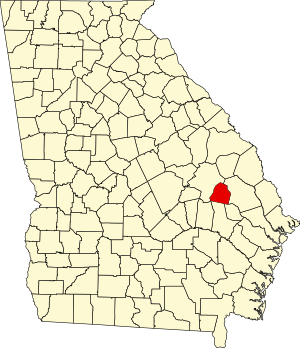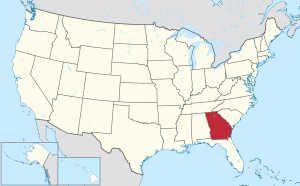Candler County, Georgia
Candler County | |
|---|---|
 Candler County Courthouse, in Metter | |
 Location within the U.S. state of Georgia | |
 Georgia's location within the U.S. | |
| Coordinates: 32°24′N 82°04′W / 32.4°N 82.07°W | |
| Country | |
| State | |
| Founded | 1914 |
| Named for | Allen D. Candler |
| Seat | Metter |
| Largest city | Metter |
| Area | |
| • Total | 249 sq mi (640 km2) |
| • Land | 243 sq mi (630 km2) |
| • Water | 5.8 sq mi (15 km2) 2.3% |
| Population (2020) | |
| • Total | 10,981 |
| • Density | 45/sq mi (17/km2) |
| Time zone | UTC−5 (Eastern) |
| • Summer (DST) | UTC−4 (EDT) |
| Congressional district | 12th |
| Website | metter-candler |
Candler County is a county located in the southeastern part of the U.S. state of Georgia. As of the 2020 census, the population was 10,981.[1] The county seat is Metter.[2] The county was founded in 1914 and named for Allen D. Candler, the 56th governor of Georgia.[3]
Geography[edit]
According to the U.S. Census Bureau, the county has a total area of 249 square miles (640 km2), of which 243 square miles (630 km2) is land and 5.8 square miles (15 km2) (2.3%) is water.[4]
The majority of Candler County is located in the Canoochee River sub-basin of the Ogeechee River basin. The western edge of the county, west of State Route 57, is located in the Ohoopee River sub-basin of the Altamaha River basin.[5]
Major highways[edit]
 Interstate 16
Interstate 16 State Route 23
State Route 23 State Route 46
State Route 46 State Route 57
State Route 57 State Route 121
State Route 121 State Route 129
State Route 129 State Route 404 (unsigned designation for I-16)
State Route 404 (unsigned designation for I-16)
Adjacent counties[edit]
- Bulloch County (east)
- Evans County (southeast)
- Tattnall County (south)
- Emanuel County (northwest)
Communities[edit]
City[edit]
- Metter (county seat)
Town[edit]
Demographics[edit]
| Census | Pop. | Note | %± |
|---|---|---|---|
| 1920 | 9,228 | — | |
| 1930 | 8,991 | −2.6% | |
| 1940 | 9,103 | 1.2% | |
| 1950 | 8,063 | −11.4% | |
| 1960 | 6,672 | −17.3% | |
| 1970 | 6,412 | −3.9% | |
| 1980 | 7,518 | 17.2% | |
| 1990 | 7,744 | 3.0% | |
| 2000 | 9,577 | 23.7% | |
| 2010 | 10,998 | 14.8% | |
| 2020 | 10,981 | −0.2% | |
| 2023 (est.) | 11,059 | [6] | 0.7% |
| U.S. Decennial Census[7] 1790-1880[8]1890-1910[9] 1920-1930[10] 1930-1940[11] 1940-1950[12] 1960-1980[13] 1980-2000[14] 2010[15] | |||
| Race | Num. | Perc. |
|---|---|---|
| White (non-Hispanic) | 6,567 | 59.8% |
| Black or African American (non-Hispanic) | 2,681 | 24.41% |
| Native American | 19 | 0.17% |
| Asian | 63 | 0.57% |
| Pacific Islander | 3 | 0.03% |
| Other/Mixed | 270 | 2.46% |
| Hispanic or Latino | 1,378 | 12.55% |
As of the 2020 United States census, there were 10,981 people, 4,013 households, and 2,775 families residing in the county.
Education[edit]
Politics[edit]
| Year | Republican | Democratic | Third party | |||
|---|---|---|---|---|---|---|
| No. | % | No. | % | No. | % | |
| 2020 | 3,133 | 70.71% | 1,269 | 28.64% | 29 | 0.65% |
| 2016 | 2,664 | 70.79% | 1,026 | 27.27% | 73 | 1.94% |
| 2012 | 2,344 | 66.38% | 1,157 | 32.77% | 30 | 0.85% |
| 2008 | 2,286 | 64.91% | 1,209 | 34.33% | 27 | 0.77% |
| 2004 | 2,048 | 64.91% | 1,096 | 34.74% | 11 | 0.35% |
| 2000 | 1,643 | 60.36% | 1,053 | 38.68% | 26 | 0.96% |
| 1996 | 1,131 | 45.22% | 1,097 | 43.86% | 273 | 10.92% |
| 1992 | 1,014 | 36.81% | 1,192 | 43.27% | 549 | 19.93% |
| 1988 | 1,261 | 58.82% | 877 | 40.90% | 6 | 0.28% |
| 1984 | 1,497 | 59.62% | 1,014 | 40.38% | 0 | 0.00% |
| 1980 | 1,030 | 42.54% | 1,358 | 56.09% | 33 | 1.36% |
| 1976 | 646 | 31.76% | 1,388 | 68.24% | 0 | 0.00% |
| 1972 | 1,427 | 85.71% | 238 | 14.29% | 0 | 0.00% |
| 1968 | 552 | 19.98% | 587 | 21.25% | 1,624 | 58.78% |
| 1964 | 1,710 | 68.26% | 795 | 31.74% | 0 | 0.00% |
| 1960 | 433 | 31.47% | 943 | 68.53% | 0 | 0.00% |
| 1956 | 308 | 23.62% | 996 | 76.38% | 0 | 0.00% |
| 1952 | 422 | 22.57% | 1,448 | 77.43% | 0 | 0.00% |
| 1948 | 125 | 12.41% | 589 | 58.49% | 293 | 29.10% |
| 1944 | 138 | 17.45% | 653 | 82.55% | 0 | 0.00% |
| 1940 | 63 | 7.75% | 748 | 92.00% | 2 | 0.25% |
| 1936 | 80 | 7.44% | 992 | 92.28% | 3 | 0.28% |
| 1932 | 13 | 2.65% | 476 | 97.14% | 1 | 0.20% |
| 1928 | 133 | 24.45% | 411 | 75.55% | 0 | 0.00% |
| 1924 | 14 | 5.20% | 241 | 89.59% | 14 | 5.20% |
| 1920 | 68 | 9.18% | 673 | 90.82% | 0 | 0.00% |
| 1916 | 28 | 5.96% | 442 | 94.04% | 0 | 0.00% |
| 1912 | 104 | 18.81% | 443 | 80.11% | 6 | 1.08% |
See also[edit]
References[edit]
- ^ "Census - Geography Profile: Candler County, Georgia". United States Census Bureau. Retrieved December 26, 2022.
- ^ "Find a County". National Association of Counties. Archived from the original on May 31, 2011. Retrieved June 7, 2011.
- ^ "Candler County". Georgia.gov. Archived from the original on June 14, 2012. Retrieved March 19, 2018.
- ^ "US Gazetteer files: 2010, 2000, and 1990". United States Census Bureau. February 12, 2011. Retrieved April 23, 2011.
- ^ "Georgia Soil and Water Conservation Commission Interactive Mapping Experience". Georgia Soil and Water Conservation Commission. Archived from the original on October 3, 2018. Retrieved November 22, 2015.
- ^ "Annual Estimates of the Resident Population for Counties: April 1, 2020 to July 1, 2023". United States Census Bureau. Retrieved March 31, 2024.
- ^ "Decennial Census of Population and Housing by Decades". US Census Bureau.
- ^ "1880 Census Population by Counties 1790-1800" (PDF). US Census Bureau. 1880.
- ^ "1910 Census of Population - Georgia" (PDF). US Census Bureau. 1910.
- ^ "1930 Census of Population - Georgia" (PDF). US Census Bureau. 1930.
- ^ "1940 Census of Population - Georgia" (PDF). US Census Bureau. 1940.
- ^ "1950 Census of Population - Georgia -" (PDF). US Census Bureau. 1950.
- ^ "1980 Census of Population - Number of Inhabitants - Georgia" (PDF). US Census Bureau. 1980.
- ^ "2000 Census of Population - Population and Housing Unit Counts - Georgia" (PDF). US Census Bureau. 2000.
- ^ "State & County QuickFacts". United States Census Bureau. Archived from the original on June 7, 2011. Retrieved February 15, 2014.
- ^ "Explore Census Data". data.census.gov. Retrieved December 18, 2021.
- ^ Leip, David. "Dave Leip's Atlas of U.S. Presidential Elections". uselectionatlas.org. Retrieved March 19, 2018.
External links[edit]
- Candler County
- Candler County historical marker

